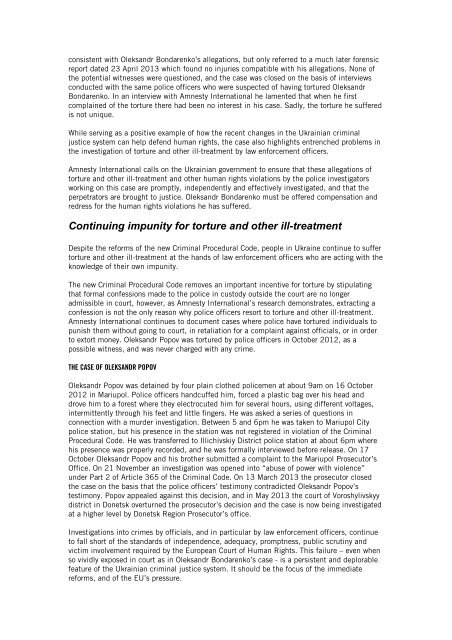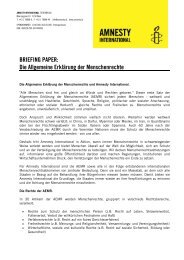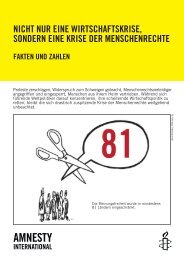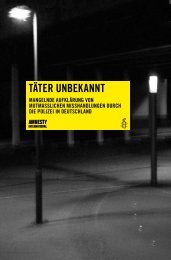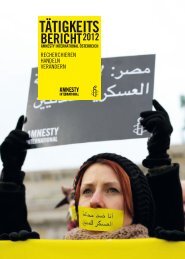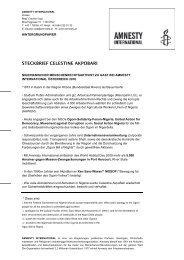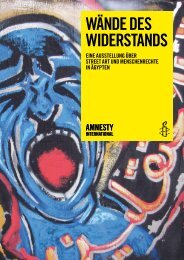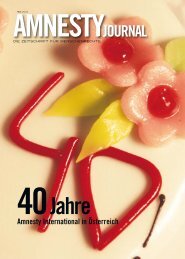AMNESTY INTERNATIONAL PUBLIC STATEMENT Ukraine and the ...
AMNESTY INTERNATIONAL PUBLIC STATEMENT Ukraine and the ...
AMNESTY INTERNATIONAL PUBLIC STATEMENT Ukraine and the ...
You also want an ePaper? Increase the reach of your titles
YUMPU automatically turns print PDFs into web optimized ePapers that Google loves.
consistent with Oleks<strong>and</strong>r Bondarenko’s allegations, but only referred to a much later forensicreport dated 23 April 2013 which found no injuries compatible with his allegations. None of<strong>the</strong> potential witnesses were questioned, <strong>and</strong> <strong>the</strong> case was closed on <strong>the</strong> basis of interviewsconducted with <strong>the</strong> same police officers who were suspected of having tortured Oleks<strong>and</strong>rBondarenko. In an interview with Amnesty International he lamented that when he firstcomplained of <strong>the</strong> torture <strong>the</strong>re had been no interest in his case. Sadly, <strong>the</strong> torture he sufferedis not unique.While serving as a positive example of how <strong>the</strong> recent changes in <strong>the</strong> Ukrainian criminaljustice system can help defend human rights, <strong>the</strong> case also highlights entrenched problems in<strong>the</strong> investigation of torture <strong>and</strong> o<strong>the</strong>r ill-treatment by law enforcement officers.Amnesty International calls on <strong>the</strong> Ukrainian government to ensure that <strong>the</strong>se allegations oftorture <strong>and</strong> o<strong>the</strong>r ill-treatment <strong>and</strong> o<strong>the</strong>r human rights violations by <strong>the</strong> police investigatorsworking on this case are promptly, independently <strong>and</strong> effectively investigated, <strong>and</strong> that <strong>the</strong>perpetrators are brought to justice. Oleks<strong>and</strong>r Bondarenko must be offered compensation <strong>and</strong>redress for <strong>the</strong> human rights violations he has suffered.Continuing impunity for torture <strong>and</strong> o<strong>the</strong>r ill-treatmentDespite <strong>the</strong> reforms of <strong>the</strong> new Criminal Procedural Code, people in <strong>Ukraine</strong> continue to suffertorture <strong>and</strong> o<strong>the</strong>r ill-treatment at <strong>the</strong> h<strong>and</strong>s of law enforcement officers who are acting with <strong>the</strong>knowledge of <strong>the</strong>ir own impunity.The new Criminal Procedural Code removes an important incentive for torture by stipulatingthat formal confessions made to <strong>the</strong> police in custody outside <strong>the</strong> court are no longeradmissible in court, however, as Amnesty International’s research demonstrates, extracting aconfession is not <strong>the</strong> only reason why police officers resort to torture <strong>and</strong> o<strong>the</strong>r ill-treatment.Amnesty International continues to document cases where police have tortured individuals topunish <strong>the</strong>m without going to court, in retaliation for a complaint against officials, or in orderto extort money. Oleks<strong>and</strong>r Popov was tortured by police officers in October 2012, as apossible witness, <strong>and</strong> was never charged with any crime.THE CASE OF OLEKSANDR POPOVOleks<strong>and</strong>r Popov was detained by four plain clo<strong>the</strong>d policemen at about 9am on 16 October2012 in Mariupol. Police officers h<strong>and</strong>cuffed him, forced a plastic bag over his head <strong>and</strong>drove him to a forest where <strong>the</strong>y electrocuted him for several hours, using different voltages,intermittently through his feet <strong>and</strong> little fingers. He was asked a series of questions inconnection with a murder investigation. Between 5 <strong>and</strong> 6pm he was taken to Mariupol Citypolice station, but his presence in <strong>the</strong> station was not registered in violation of <strong>the</strong> CriminalProcedural Code. He was transferred to Illichivskiy District police station at about 6pm wherehis presence was properly recorded, <strong>and</strong> he was formally interviewed before release. On 17October Oleks<strong>and</strong>r Popov <strong>and</strong> his bro<strong>the</strong>r submitted a complaint to <strong>the</strong> Mariupol Prosecutor’sOffice. On 21 November an investigation was opened into “abuse of power with violence”under Part 2 of Article 365 of <strong>the</strong> Criminal Code. On 13 March 2013 <strong>the</strong> prosecutor closed<strong>the</strong> case on <strong>the</strong> basis that <strong>the</strong> police officers’ testimony contradicted Oleks<strong>and</strong>r Popov’stestimony. Popov appealed against this decision, <strong>and</strong> in May 2013 <strong>the</strong> court of Voroshylivskyydistrict in Donetsk overturned <strong>the</strong> prosecutor’s decision <strong>and</strong> <strong>the</strong> case is now being investigatedat a higher level by Donetsk Region Prosecutor’s office.Investigations into crimes by officials, <strong>and</strong> in particular by law enforcement officers, continueto fall short of <strong>the</strong> st<strong>and</strong>ards of independence, adequacy, promptness, public scrutiny <strong>and</strong>victim involvement required by <strong>the</strong> European Court of Human Rights. This failure – even whenso vividly exposed in court as in Oleks<strong>and</strong>r Bondarenko’s case - is a persistent <strong>and</strong> deplorablefeature of <strong>the</strong> Ukrainian criminal justice system. It should be <strong>the</strong> focus of <strong>the</strong> immediatereforms, <strong>and</strong> of <strong>the</strong> EU’s pressure.


